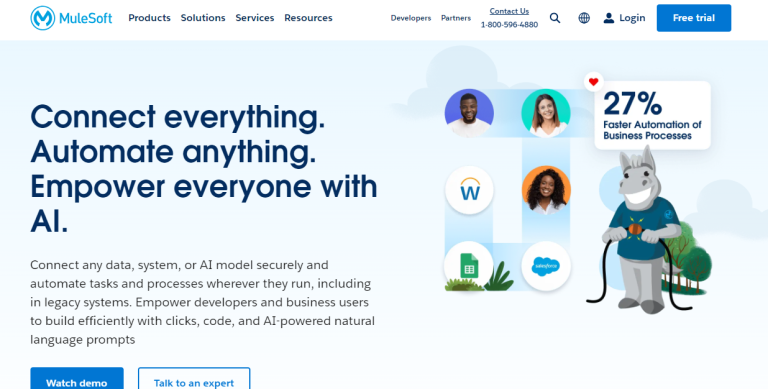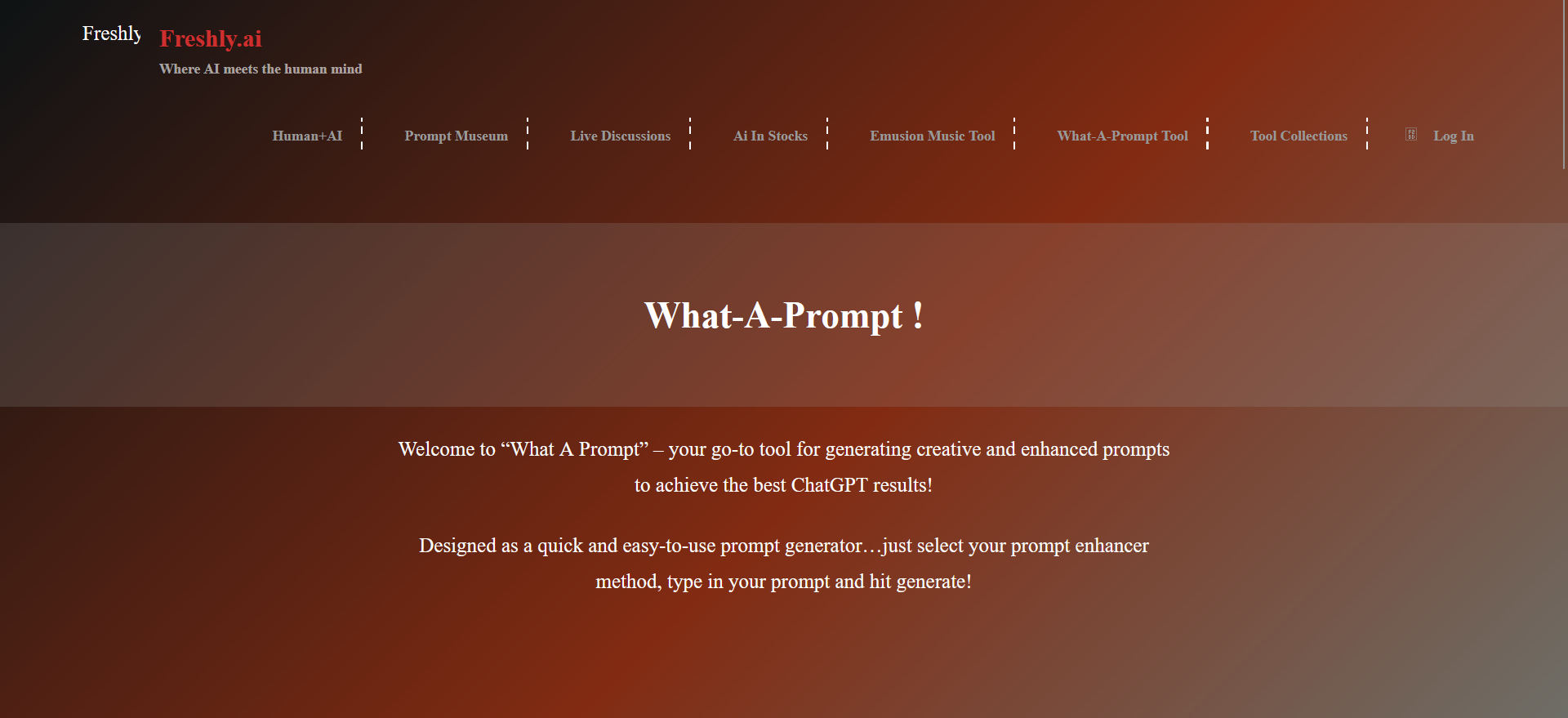Published on: April 23, 2024
MuleSoft Review: Features, Pricing & Use Cases
Author: Inge Vonaulock

Ready to tame the digital beast? Well, hold onto your hats because we’re diving into the wild world of MuleSoft, the software whiz kid that’s revolutionizing the way businesses connect. Whether you’re knee-deep in data or just dipping your toes into digital transformation, understanding MuleSoft’s magic is like finding the
What’s MuleSoft, you ask?
Picture this: a digital Swiss Army knife that not only connects all your tech dots—from apps and data to devices—but also does it both in the cloud and on the ground. At the heart of this tech tangle is MuleSoft’s Anypoint Platform, a place where APIs are not just created; they’re crowned kings, ruling over a kingdom where data flows freely and everything works together in harmony.
From knitting together complex systems to transforming data into a format your grandma could understand, MuleSoft is like having a digital wizard by your side. Need to push a button here and pull data there? MuleSoft’s got your back, ensuring your business runs as smoothly as a well-oiled machine.
And why should you care?
Because in the kingdom of MuleSoft.com, efficiency reigns supreme. Here, productivity spikes as developers drop the grunt work and pick up speed on strategic stuff that really matters. It’s about being fast on your feet, adapting at the speed of light, and scaling the heights of business without breaking a sweat.
So, whether you’re looking to boost your business, streamline your systems, or just make friends with your data, MuleSoft is your go-to guide in the digital wilderness. Ready to explore? Let’s unleash the power of connectivity with MuleSoft!
What is Mulesoft?
MuleSoft is a software company that provides integration software for connecting applications, data, and devices across both on-premises and cloud computing environments. The core offering of MuleSoft is Anypoint Platform, an integration platform as a service (iPaaS) that enables companies to realize digital transformation through API-led connectivity. Here are some key aspects of MuleSoft and its offerings:
- API-led Connectivity: MuleSoft’s approach focuses on connecting data and applications through APIs, which allows businesses to streamline their processes, improve data accessibility, and enhance interoperability between different systems.
- Anypoint Platform: This platform allows organizations to design, deploy, and manage APIs. It serves as a unified solution for API management, enabling companies to develop, secure, and monitor APIs throughout their lifecycle. Anypoint Platform also includes tools for building, testing, and managing integrations.
- Integration Capabilities: MuleSoft provides powerful tools for automating business processes, integrating disparate systems, and converting data between various formats. This helps organizations improve their operational efficiency and data flow.
- CloudHub: A cloud-based integration service, part of Anypoint Platform, which provides a multi-tenant, secure, and scalable environment to execute and manage integrations and APIs.
MuleSoft’s solutions are widely used across various industries to help businesses accelerate IT project delivery, increase operational efficiency, and enhance scalability and security in their digital transformation efforts.
MuleSoft Features and Benefits
MuleSoft, known for its comprehensive Anypoint Platform, offers a variety of features and benefits that cater to businesses looking to streamline their integration processes. Here’s an overview of some of the key features and benefits of using MuleSoft:
Key Features of MuleSoft
- API-Led Connectivity: MuleSoft promotes API-led connectivity, allowing businesses to create a network of applications, data, and devices through reusable APIs. This approach decouples systems and allows changes to be made quickly and efficiently.
- Anypoint Platform: This integrated platform enables users to design, deploy, manage, and secure APIs and integrations from a single unified platform. It supports a variety of integration patterns including real-time, batch, and event-driven.
- CloudHub: A cloud-based integration service provided by MuleSoft that allows enterprises to deploy integration applications and APIs with high availability, multi-tenancy, and scalable infrastructure.
- DataWeave: MuleSoft’s powerful data query and transformation language, which allows users to access, transform, and integrate data from various systems.
- Pre-built Connectors: With hundreds of connectors for popular apps, data sources, and devices, MuleSoft facilitates the integration of a wide array of systems, reducing the need for custom code.
Benefits of MuleSoft
- Enhanced Productivity: By streamlining the integration process and reducing the need for custom coding, MuleSoft enables developers to focus more on strategic initiatives rather than managing integrations.
- Agility: The API-led approach allows businesses to be more agile and responsive to changes, enabling faster deployment and adaptation to new business requirements.
- Scalability: MuleSoft supports scalable integration architectures, making it easier for businesses to expand and adapt their integration infrastructure as they grow.
- Unified Security: The Anypoint Platform includes out-of-the-box security policies and tools that help secure APIs and integrations against threats and vulnerabilities.
- Operational Efficiency: Real-time monitoring and analytics tools within MuleSoft provide insights into API performance, helping businesses optimize operations and improve decision-making.
- Connectivity Across Various Environments: MuleSoft supports connectivity across cloud, on-premises, and hybrid environments, enabling seamless data flow and system integration regardless of where the applications reside.
By leveraging these features, organizations can significantly enhance their integration capabilities, leading to improved operational efficiency, reduced IT complexity, and greater ability to meet modern business demands. MuleSoft’s platform is particularly beneficial for large enterprises that need robust, scalable solutions to manage multiple integrations across diverse environments.
What is MuleSoft used for?
MuleSoft is used primarily for connecting different software applications, data, and devices within and across organizations through its platform, Anypoint Platform. Here are some specific uses and benefits of MuleSoft:
- API Management: MuleSoft is widely used for designing, building, managing, and securing APIs (Application Programming Interfaces). This allows businesses to facilitate seamless communication between different software products and services.
- Integration: MuleSoft enables integration of various systems, whether they are on-premises or in the cloud. This helps organizations create connected experiences and streamline their operations by allowing different applications to communicate effectively with each other.
- Data Transformation: The platform offers tools to transform data to and from different formats, making it easier for systems that use different data structures to work together.
- Microservices Architecture: It supports the development and deployment of microservices by managing and facilitating communication between them, helping organizations to enhance their IT flexibility and scalability.
- Automation: By automating business processes and enabling data flow between applications, MuleSoft helps reduce manual workloads and improves efficiency.
- Legacy System Modernization: MuleSoft helps companies modernize their legacy systems, making it easier to integrate with new applications and technologies.
MuleSoft is particularly beneficial for businesses looking to streamline workflows, enhance productivity, and drive digital transformation by leveraging API-led connectivity.
MuleSoft Best Use Cases
MuleSoft is particularly well-suited for a variety of use cases where integration and API management are key components of digital transformation. Here are some of the best use cases for MuleSoft:
- Application Integration: MuleSoft excels in connecting disparate applications within an organization, whether they are legacy systems, SaaS applications, or proprietary platforms. This helps businesses streamline workflows, improve data consistency, and reduce operational silos.
- API Creation and Management: Businesses use MuleSoft to design, build, manage, and secure APIs. This is crucial for organizations looking to open up their internal systems to external developers, business partners, or other departments within the organization, facilitating a more seamless flow of data and expanding their service offerings.
- Data Integration and ETL (Extract, Transform, Load): MuleSoft is used to integrate data from different sources, transform it into a common format, and load it into a destination system like a data warehouse. This supports analytics initiatives by providing a unified view of data spread across many systems.
- Microservices Architecture: MuleSoft supports the development of microservices by enabling the decomposition of legacy applications into smaller, modular services that can be developed, deployed, and scaled independently.
- B2B Communication: MuleSoft aids in automating business-to-business (B2B) transactions and communication, managing data exchange across businesses efficiently and securely. This is particularly valuable in industries where supply chain management, procurement, and sales operations involve complex interactions with external partners.
- Mobile Application Development: MuleSoft can be used to rapidly develop APIs that power mobile applications, providing the backend services necessary for mobile app functionalities such as fetching data, user management, and push notifications.
- IoT (Internet of Things): In IoT applications, MuleSoft can be used to integrate various IoT devices and orchestrate data flow between devices and back-end systems. This is crucial for real-time monitoring and management of IoT environments.
These use cases highlight MuleSoft’s capability to enhance connectivity across an enterprise, streamline processes, and boost operational efficiency by leveraging its powerful API-led connectivity approach. Businesses across various industries can deploy MuleSoft to overcome integration challenges and drive digital transformation initiatives effectively.
MuleSoft Pricing
MuleSoft offers a variety of pricing plans tailored to different business needs, primarily through its Anypoint Platform. The pricing structure is subscription-based and varies depending on the package and services chosen.

Key Pricing Packages:
- Anypoint Integration Starter: This package is designed for businesses just starting with APIs and integrations. It includes basic API management capabilities and support for designing, managing, and deploying APIs and integrations.
- Anypoint Integration Advanced: This package offers advanced features suitable for deploying integrations across an enterprise. It includes enhanced monitoring, log management, and support for global multi-cloud deployment and clustering for high availability.
- API Management Solution: For businesses focusing primarily on API management, this package offers comprehensive tools for full lifecycle API management, including API governance and the management of APIs across any environment.
Each of these packages includes different levels of functionality and support, and businesses can request quotes based on their specific requirements (MuleSoft) (Salesforce).
Additional Costs:
- MuleSoft’s pricing can also vary based on the volume of API requests, the number of APIs managed, and additional features such as high availability, scalability options, and advanced monitoring tools.
Businesses interested in MuleSoft services can start with a free trial to gauge the platform’s capabilities before committing to a subscription (Salesforce).
For more detailed information on the specific features included in each package and to get a tailored quote, visiting MuleSoft’s official pricing page would be the best step forward.
MuleSoft User Reviews
MuleSoft Anypoint Platform has garnered positive feedback from users across various review platforms, reflecting its effectiveness in API management and integration capabilities.

User Feedback Highlights:
- Versatility and Scalability: Users appreciate the Anypoint Platform for its ability to connect disparate systems effectively, which significantly streamlines workflows. The platform’s scalability is particularly noted for adapting well to growing business demands, making it a robust choice for expanding enterprises.
- User Interface: The platform is generally praised for its user-friendly interface, which, despite a steep initial learning curve, facilitates easier integration once users become accustomed to the environment.
- Integration Capabilities: MuleSoft is highly regarded for its comprehensive integration features that support both real-time and batch processing, essential for dynamic data management and transfer across systems.
- Support and Community: The strong support from MuleSoft and the active community around it are frequently highlighted as valuable resources. These aspects help users navigate challenges and optimize their use of the platform.
- Cost Considerations: While the platform is acknowledged for its high performance, some users point out the cost as a significant factor, noting that MuleSoft can be on the pricier side compared to some alternatives.
Overall, MuleSoft Anypoint Platform is well-regarded in the IT and data analytics communities for its robust API management and integration tools, making it a solid choice for businesses looking to enhance their digital infrastructure. However, potential users should consider the total cost of ownership and evaluate whether the platform aligns with their budget and technical requirements.
For more detailed user reviews and additional insights, platforms like G2, TrustRadius, and SoftwareReviews offer extensive user-generated content that could help inform a potential decision (trustradius) (SoftwareReviews).
Top alternatives to MuleSoft
Here are some of the top alternatives to MuleSoft that you might consider based on different integration needs and capabilities:
- Astera Centerprise – This is a robust data integration platform that allows you to build automated data pipelines in a no-code environment. It’s known for its extensive library of connectors and built-in data transformations, making it suitable for organizations that require a unified platform for complex data handling and integration tasks (Astera).
- Dell Boomi – A cloud-based integration platform that offers comprehensive solutions including application and data integration, API management, and master data management. It’s known for its drag-and-drop interface and pre-built connectors which facilitate rapid integration (Astera).
- IBM App Connect – This platform offers a cloud-based integration solution that connects applications, data, and devices across different environments. It’s especially noted for its AI capabilities which simplify the mapping and transforming of data (Astera).
- SnapLogic – Provides a user-friendly, low-code integration platform that supports a wide range of integrations across apps, data sources, and devices. It is suitable for businesses looking for scalable and efficient data integration solutions with support for both ETL and ELT processes (Business Strategy Hub).
- Jitterbit – Known for its speed and quality of support, Jitterbit offers a powerful iPaaS solution that excels in e-commerce integrations. It is particularly strong in automating and optimizing workflows across various digital and physical sales channels (Business Strategy Hub).
- Tray.io – This tool is well-suited for organizations looking to optimize their IT processes through robust workflow automation capabilities. Tray.io allows you to define triggers, conditions, and actions within workflows, which is great for enhancing operational efficiency (Zluri | Unified SaaS Management Platform).
These platforms provide varied strengths in integration capabilities, user experience, and specific features tailored to different organizational needs, making them worthy contenders as alternatives to MuleSoft.
Inge Vonaulock
TopApps writer
Recent Articles

Artificial intelligence (AI) is no longer the exclusive domain of large corporations. Small and medium-sized enterprises (SMEs) are increasingly leveraging AI to optimize...
Read More
Chain-of-thought prompting unlocks AI’s full potential. This technique guides AI through complex reasoning, leading to better outputs. Our experiments reveal key insights for...
Read MoreTome AI vs Gamma: The Ultimate Showdown of AI Writing Assistants in 2024 Choosing the right AI writing tool can make or break...
Read More